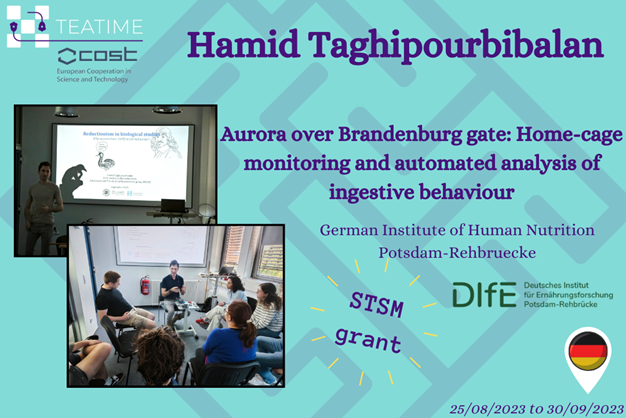
Details of the STSM
Title: Aurora over Brandenburg gate: Home-cage monitoring and automated analysis of ingestive behaviour
Start and end date: 25/08/2023 to 30/09/2023
Host: German Institute of Human Nutrition Potsdam-Rehbruecke, Germany
Host website: https://www.dife.de/en
Description of the work carried out during the STSM
This short-term scientific mission (STSM) was hosted by Dr. Rachel Lippert’s lab (NDF) at the
German Institute for Human Nutrition (DIfE) in Potsdam, Germany. The grantee, Hamid
Taghipourbibalan, works as a Ph.D. student in McCutcheon Lab at UiT: The Arctic University of
Norway where they mainly use fibre photometry, two-photon microscopy and home-cage
monitoring systems to study food-intake in mice. On the other side, Dr. Lippert’s team uses
rodent models and takes advantage of an array of modern molecular, neural tracing, and
recording techniques to study the effects of an altered maternal diet on various aspects of the
development of neural circuits involved in energy homeostasis and food-intake.
This STMS was based on 3 axes: [1] Machine-learning tools for behavioural analysis [2] Feeding
Experimentation Devices (FEDs) and [3] PhenoMaster home-cage monitoring system.
The host lab was interested in the use of machine-learning tools to automatize behavioural
analysis of their experiments. In this regard, Hamid worked closely with a postdoc fellow at NDF,
Dr. David Baidoe-Ansah; they discussed and practiced theoretical and technical aspects of deep
convolutional networks such as DeepLabCut (DLC) and SLEAP. This includes dry-lab procedures
and troubleshooting such as installation of DLC and SIMBA, coding in Python and creating a step-
by-step pipeline for training a network in DLC to detect mouse body parts in a series of videos.
They also used SIMBA to measure and quantify some behavioural parameters based on the
body-part coordinates obtained from DLC.
During this STSM, the grantee delivered a workshop at the institute level with practical session
on the use of FED system as an open-source tool for home-cage monitoring of feeding behaviour
in mice. Furthermore, he had an oral presentation at group level titled “Reductionism in
biological studies: why neuroscience needs behaviour?” where they discussed philosophy of
science and the importance of accurate behavioural experiments.
Apart from visiting different laboratories at DIfE, Hamid also had the opportunity to visit the
animal facility and observe the process of calibrating and running cages in the PhenoMaster
home-cage monitoring system, examined the readouts and collected necessary information for
his home laboratory.
This STSM also opened the opportunity for Hamid to participate in the institutional Ph.D.
symposium and attend talks from experts of feeding behaviour and neuroscience including Ivan
de Araujo (Director of Max Planck Institute for Biological Cybernetics) and Giles Yeo (University
of Cambridge). With the support they received from COST-TEATIME the two labs in Norway and
Germany established a reliable connection and look forward to further collaborations in the
future.